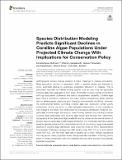Files in this item
Species distribution modeling predicts significant declines in coralline algae populations under projected climate change with implications for conservation policy
Item metadata
| dc.contributor.author | Simon-Nutbrown, Cornelia | |
| dc.contributor.author | Hollingsworth, Peter M. | |
| dc.contributor.author | Fernandes, Teresa F. | |
| dc.contributor.author | Kamphausen, Lisa | |
| dc.contributor.author | Baxter, John M. | |
| dc.contributor.author | Burdett, Heidi L. | |
| dc.date.accessioned | 2020-10-06T10:30:03Z | |
| dc.date.available | 2020-10-06T10:30:03Z | |
| dc.date.issued | 2020-09-14 | |
| dc.identifier | 270416304 | |
| dc.identifier | 7ed3774d-88e5-4e1a-a735-94240df06ad3 | |
| dc.identifier | 85091699135 | |
| dc.identifier | 000573661000001 | |
| dc.identifier.citation | Simon-Nutbrown , C , Hollingsworth , P M , Fernandes , T F , Kamphausen , L , Baxter , J M & Burdett , H L 2020 , ' Species distribution modeling predicts significant declines in coralline algae populations under projected climate change with implications for conservation policy ' , Frontiers in Marine Science , vol. 7 , 575825 . https://doi.org/10.3389/fmars.2020.575825 | en |
| dc.identifier.issn | 2296-7745 | |
| dc.identifier.other | Bibtex: 10.3389/fmars.2020.575825 | |
| dc.identifier.uri | https://hdl.handle.net/10023/20727 | |
| dc.description | Funding: This work was funded by a NERC iCASE studentship award to HB, PH, JB, and TF (NE/R007233/1). The Royal Botanic Garden Edinburgh acknowledges funding support from the Scottish Government Rural and Environment Sciences and Analytical Services Division (RESAS). This is a contribution to the Scottish Blue Carbon Forum. | en |
| dc.description.abstract | Anthropogenic climate change presents a major challenge to coastal ecosystems. Mass population declines or geographic shifts in species ranges are expected to occur, potentially leading to wide-scale ecosystem disruption or collapse. This is particularly important for habitat-forming species such as free-living non-geniculate coralline algae that aggregate to form large, structurally complex reef-life ecosystems with high associated biodiversity and carbon sequestration capability. Coralline algal beds have a worldwide distribution, but have recently experienced global declines due to anthropogenic pressures and changing environmental conditions. However, the environmental factors controlling coralline algal bed distribution remain poorly understood, limiting our ability to make adequate assessments of how populations may change in the future. We constructed the first species distribution model for non-geniculate coralline algae (focusing on maerl-forming species but including crustose coralline algae associated with coralline algal beds) and showed that bathymetry, temperature at the seabed and light availability are the primary environmental drivers of present-day non-geniculate coralline algae distribution. Our model also identifies suitable areas for species presence that currently lack records of occurrence. Large-scale spatial declines in coralline algal distribution were observed under all IPCC Representative Concentration Pathways (ranging from 38% decline under RCP 2.6 up to 84% decline under RCP 8.5), with the most rapid rate of decline up to 2050. Refuge populations that may persist under projected climate change were also identified – informing priority areas for future conservation efforts to maximize the long-term survival of this globally important ecosystem. | |
| dc.format.extent | 14 | |
| dc.format.extent | 3355942 | |
| dc.language.iso | eng | |
| dc.relation.ispartof | Frontiers in Marine Science | en |
| dc.subject | Biodiversity | en |
| dc.subject | Biogeography | en |
| dc.subject | Climate change | en |
| dc.subject | Scotland | en |
| dc.subject | Ecology | en |
| dc.subject | Marine conservation | en |
| dc.subject | Maerl | en |
| dc.subject | Rhodolith | en |
| dc.subject | GC Oceanography | en |
| dc.subject | GE Environmental Sciences | en |
| dc.subject | QH301 Biology | en |
| dc.subject | 3rd-DAS | en |
| dc.subject | SDG 13 - Climate Action | en |
| dc.subject | SDG 14 - Life Below Water | en |
| dc.subject.lcc | GC | en |
| dc.subject.lcc | GE | en |
| dc.subject.lcc | QH301 | en |
| dc.title | Species distribution modeling predicts significant declines in coralline algae populations under projected climate change with implications for conservation policy | en |
| dc.type | Journal article | en |
| dc.contributor.institution | University of St Andrews. School of Biology | en |
| dc.contributor.institution | University of St Andrews. School of Earth & Environmental Sciences | en |
| dc.identifier.doi | 10.3389/fmars.2020.575825 | |
| dc.description.status | Peer reviewed | en |
This item appears in the following Collection(s)
Items in the St Andrews Research Repository are protected by copyright, with all rights reserved, unless otherwise indicated.

